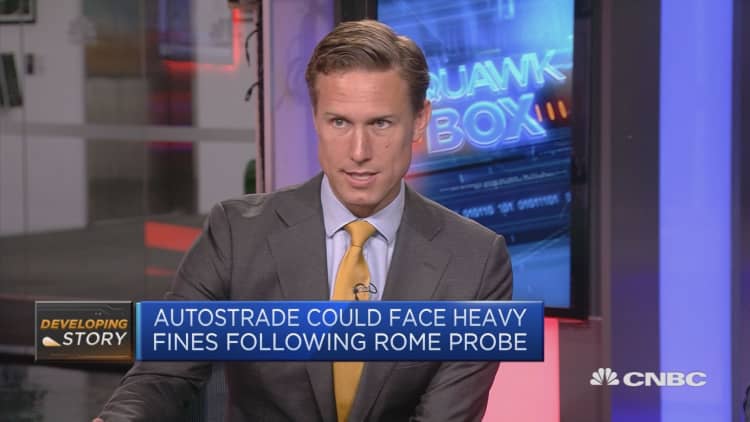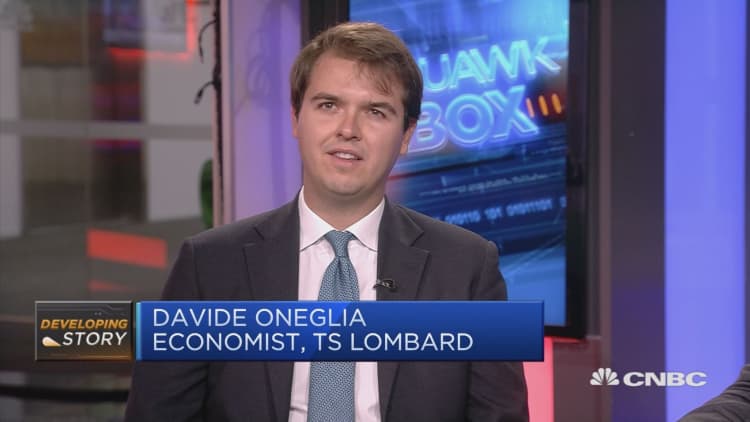
Italy is embroiled in a blame game that will ultimately discourage many international investors, an economist told CNBC Friday.
A freeway bridge collapsed on Tuesday, killing at least 39 people, in the city of Genoa. In the aftermath, Rome came under special scrutiny by international investors after deciding to immediately revoke the road management concession from Autostrade — a company that is responsible for 3,000 kilometers of toll roads in Italy — without waiting for the conclusion of the ongoing investigations. Shares of its mother company Atlantia fell by as much as 23 percent on Thursday morning.
"The responsibilities still have to be determined by the judiciary, (but) the most striking thing of this story is mostly the initial reaction of the government after the disaster," Davide Oneglia, economist at TS Lombard, said.
"The fact they have immediately taken Atlantia and investor as a scapegoat, or they are trying to bring in the European Commission, which is their usual target, might end up in the long run undermining the confidence of investors on Italian institutions," Oneglia told CNBC's "Squawk Box Europe."
"If this proceeds, it has long lasting effects on investor sentiment," he said.
Meanwhile, ratings agency Moody's has said that the Italian bridge collapse heightens political pressures and regulatory risks for Atlantia and Autostrade. The agency warns that while the immediate negative financial impact of road closure in terms of revenue loss is likely manageable for Autostrade, the political ramifications of this incident could prove to be more problematic for both the companies.
The country's political parties have apportioned blame for the disaster to, variously, previous governments, the European Union (EU), the road management company and even the mafia. Even though, many analysts have pointed out that, for example, one of the coalition partners — the leftist Five Star Movement — ignored warnings back in 2013 that the collapsed bridge was in danger.
At the same time, the other coalition partner, the right-wing Lega, has blamed the EU for not giving enough funds to Italy to invest in infrastructure.
The European Commission replied to the criticism on Thursday, saying it was time "to make a few things clear." "For the record, under the agreed fiscal rules member states are free to set specific policy priorities, for instance the development and maintenance of infrastructure," a spokesperson said, adding that Brussels has in several occasions recommended Italy to put more money in infrastructure projects.
"This episode is just one of a series," Oneglia said. "For example, we can see more or less the same approach in the way they (government) have been dealing with ILVA, the steel plant in Puglia with ArcelorMittal."

ArcelorMittal bought a steel plant in the region of Puglia, which previously belonged to the government. Apart from workers protesting against job cuts, politicians in Puglia opened a legal challenge and opposed decisions from a previous government on the grounds the buyout plan didn't curb pollution from the area fast enough. Earlier this month, the company said it is confident of reaching a deal with the unions on its new environmental clean-up plan.
Investors are also tracking the upcoming budget as a way to know better if they should look for opportunities in the southern European country. The document, which needs to be completed before mid-October, will be closely scrutinized, as investors look for clues on whether European fiscal commitments are respected and on whether the coalition government is working side by side.
Both populist parties in government have promised to increase public spending — a risky decision given the high amount of government debt — about 130 percent of its growth domestic product.
"More than ever, this budget plan is a key event for the market. First, the budget will spell out the new government's economic policies and clarify the implementation timeline of the announced reforms," Bank of America Merrill Lynch said in a note last week.
"Second, it will define the new administration's stance on the fiscal discipline requirement. This is especially important in light of the busy calendar with the rating agencies' review of Italy's outlook."


